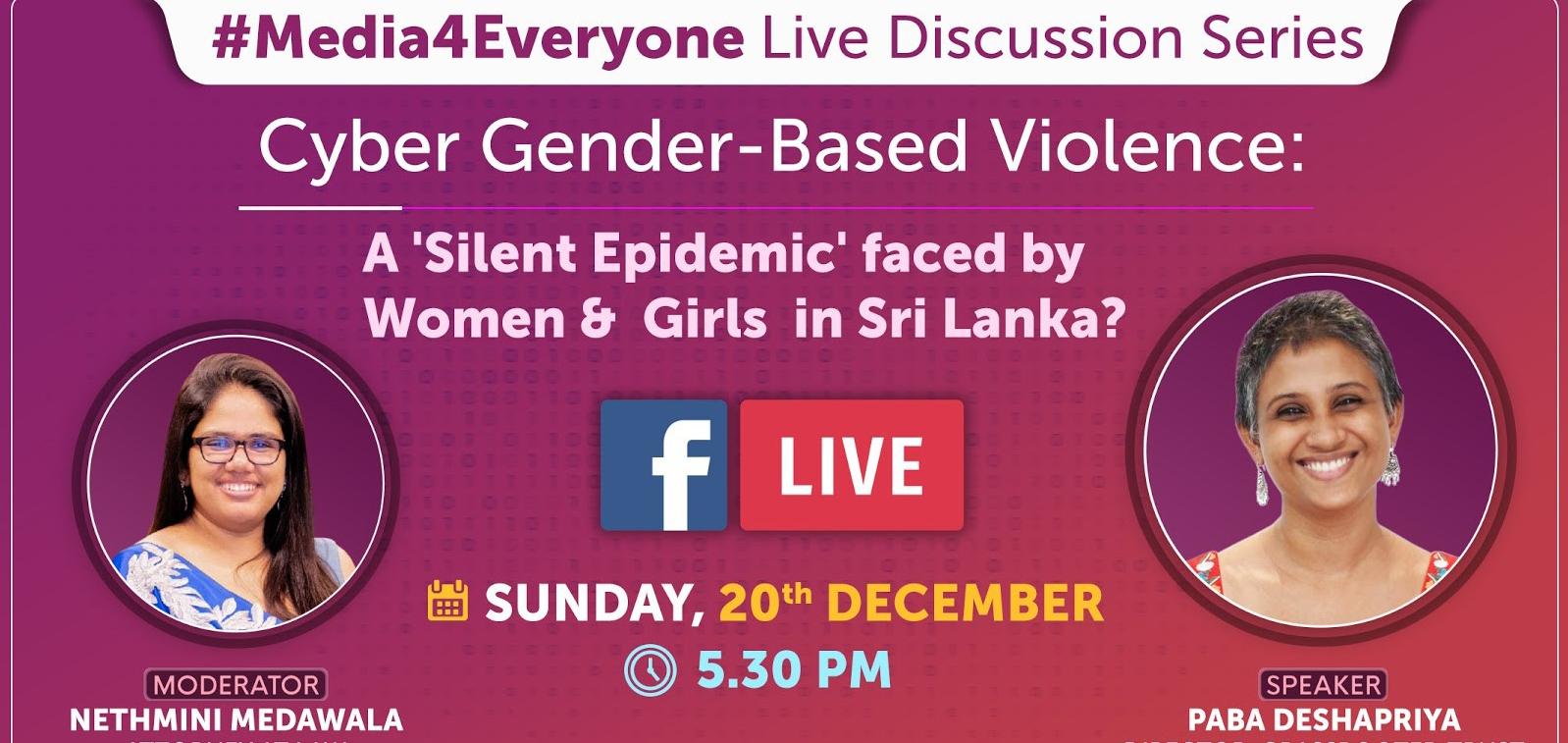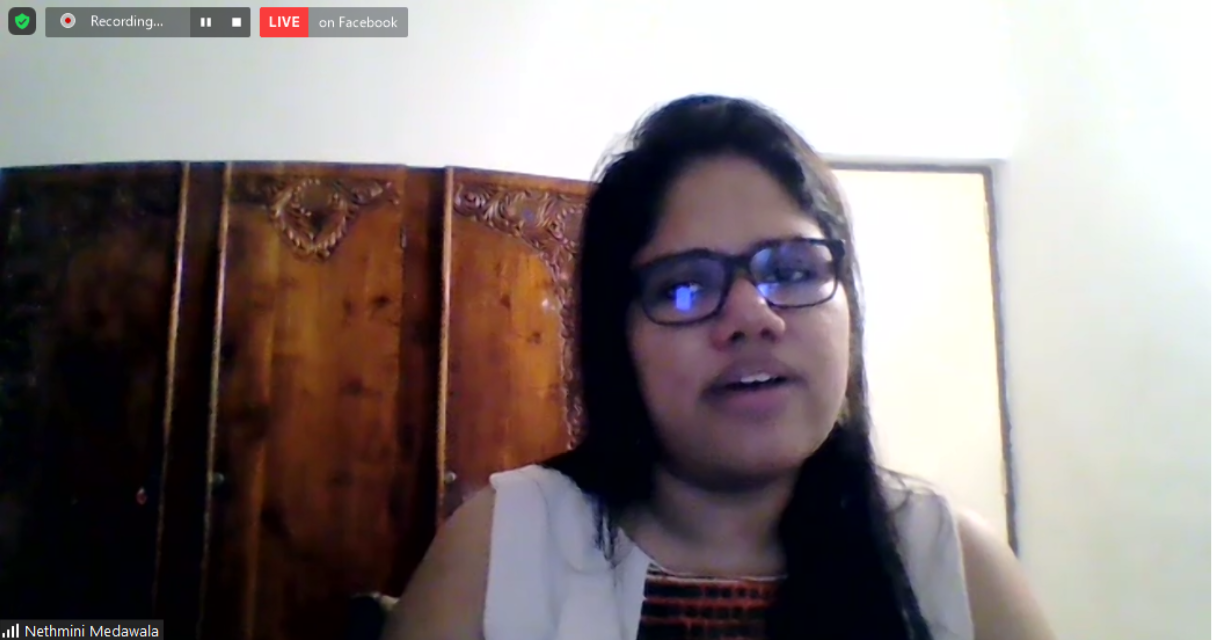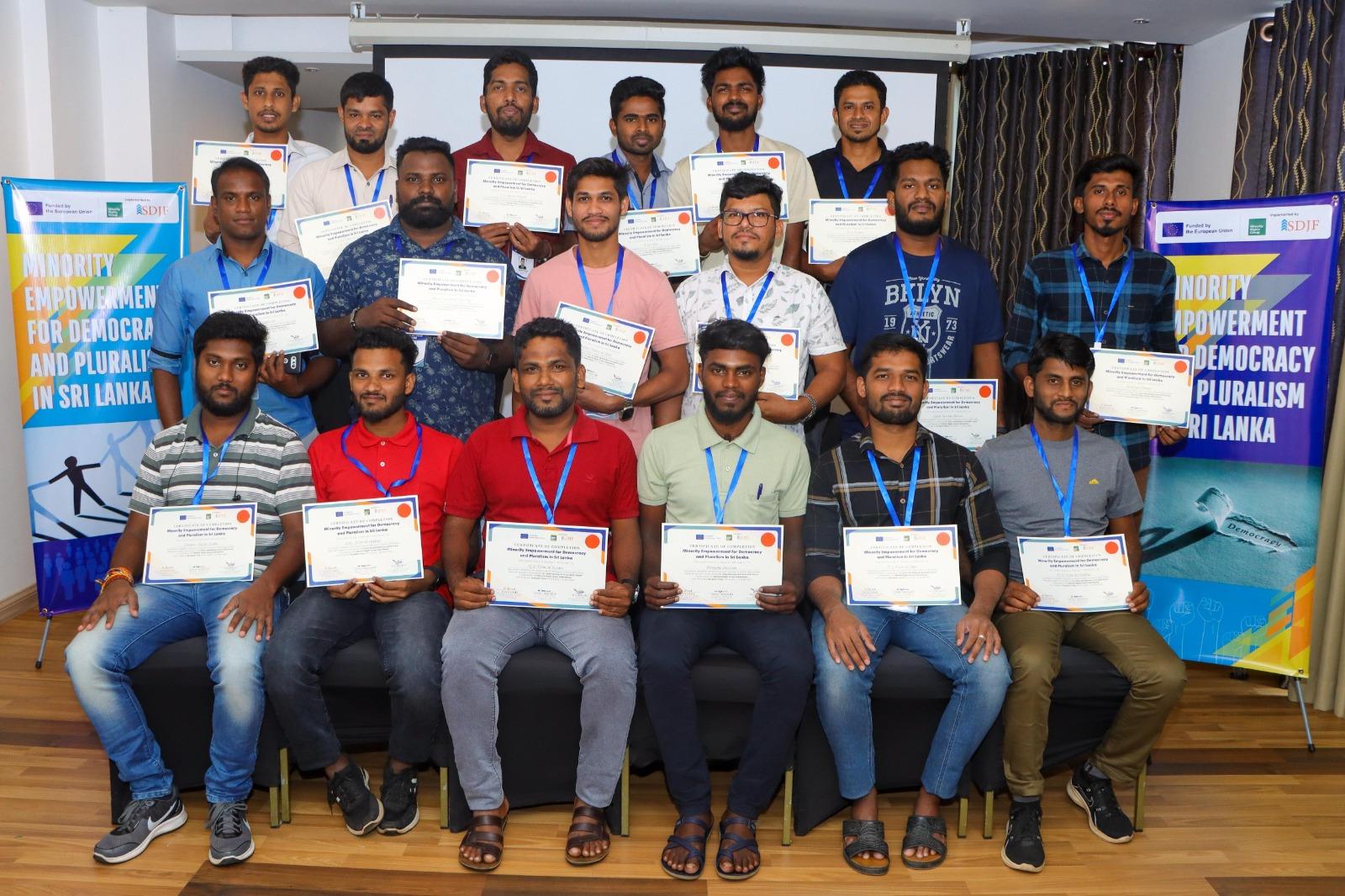5 January 2021 | SDJF_Admin

The Sri Lanka Development Journalist Forum (SDJF) organised its fifth edition of the monthly #Media4Everyone live discussion series titled “Cyber Gender-Based Violence: A 'silent epidemic' faced by women and girls in Sri Lanka?”, speaking with the Director, Grassrooted Trust, Paba Deshapriya, on cyber GBV and its unforeseen effects for women and girls in Sri Lanka. The discussion was moderated by Nethmini Medawala, Attorney-At-Law and hosted by Yamini Perera, Project Officer at SDJF. It was held on December 20, 2020, from 5.30 pm to 6.30 pm via Zoom and Facebook live. SDJF has been working towards achieving gender equality for over 10 years, driving many initiatives to come closer to achieve this goal.
Paba has been an activist and advocate for education reform around sexuality and relationship education in Sri Lanka, and has extensive experience working closely with local government authorities, trade unions, and also non-government agencies.
Differentiating online and offline GBV
From women to the LGBTIQ community, the online spaces and especially social media in Sri Lanka have turned out to a hotbed of hostility and harassment. “There are a lot of challenges to show that online GBV prevails and it mostly lies on power imbalance and behavioural patterns'' stated Paba my drawing implications as to why cyber SGBV is generalized and treated trivially even by the decision making bodies of Sri Lanka. She further emphasized that there is a common notion that cyberspace is too millennial and it is too technical. There we as a country really need to move out of such thinking and think that there is no such thing because it is a matter of changing our behavioural patterns.
Over the past few years, online GBV was a silent crime endured by many women and girls across the country mainly because nobody dares to speak about it. A vigilant observer could identify that this category of violence which we have categorized as ‘novel’ does not happen only at an individual level. There is a structural approach to this as well. Ground violence against women is akin to the tip of an iceberg, known and visible to the minds of people. It is easy to identify therefore to combat whereas online violence is complex in nature.
Silencing as violence
Who is most often victimized by cyber SGBV? While both women and girls in general grapple with this struggle, there is a common category of people who are victimized either due to their profession or freedom of expression. Female politicians, female journalists and female activists are often victimized with an aim of restricting their free and independent views. It comes as an inherent need to dehumanize women with patriarchal values, systems, institutions. Now the trolls simply understand that the best way to prevent women from coming up with their ideologies is to hurt them and bring them down including comments that attack their dignity.
Paba drew examples as to how female candidates entering politics in Sri Lanka face numerous challenges, especially during their election campaigns. Many such candidates who possess a strong voice face ‘character assassination’ on social media. These kinds of allegations against women are being carried out by different social media page admins without any proven evidence of what they are attacking. One thing which is omnipresent is that often such victimization happens for a female politician who raises their voice to challenge any undemocratic act or the rule of law.

Effects of online coercing & intimidating women
Both social media and other online spaces have made silencing and intimidating women quicker and more efficient. Unfortunately, as of yet, we have not had any fair legal responsibility towards the existing gendered power dynamics and structural inequality.
“When some sort of harassment happens on the ground, it will reach only to a very limited number of people but when it is happening online, the whole community gets to know about it; perhaps in thousands or millions” added Paba in a critical tone. She insisted on the fact that every woman and girl needs to be very vigilant when using the internet keeping in mind that there is unprecedented access to the internet.
From typing misogynist comments, spreading deceptive or inaccurate information and images to fake accounts, everything happens as a result of a continuing patriarchal cycle of inherent and intrinsic stereotypes. It is the perception of women that creates it. If a woman is vocal on a socially or politically important topic, such women are immediately put down through sexist comments, memes, pictures or simply by impersonating. Women and girls who are not aware as to how such myogenic acts should be combatted often end up leaving their jobs, schools and committing suicide. Through the culture of casual sexism prevailing on Facebook, the LGBTIQ community faces severe cyber sexual abuse and exploitations.
Where do we go from here?
Elaborating on the existing legal framework to address online GBV Paba had to add: “We always talk about bringing in laws, controlling and banning Facebook”. She also highlighted that we as individuals should think about whether it is really going to help the victims, if not it is high time to focus on our own behaviour.
Online violence is a separate entity different from any other violence against women. On the ground, the police or GBV prevention institutions know what to do when it comes to an issue of ground sexual harassment or related issue but when it is online violence most of the officials are not aware what to do. Even the women & girls who bring complaints get re-victimized and there are massive delays in justice. It is mainly due to the lack of understanding and fear for the internet as well as the generation gap.
Awareness should be created as to what are bodies that deal with such issues. i.e. CERT, Cyber Crimes Division etc. On the other hand, we need to check whether the officers who cater to these cases have real sensitivity. While briefing about redress mechanisms to address cyber SGBV, Paba insisted that it is always recommended to accompany a lawyer who understands the problem faced by the victim when it comes to complaining about online harassment. Those who are victimized by cyber SGBV can also reach organizations such as Grassrooted that will direct the relevant person/s according to the case.
“Let’s not demonize the internet. There is no proper conversation about cyber SGBV. We always focus on regulations rather than addressing the human behaviour and inculcating values such as respect, empathy, trust and conversation around consent.”

At the end of an interactive discussion, the audience on Zoom as well as Facebook thanked SDJF for organizing the December live discussion on a timely topic that everyone needs awareness of. SDJF received 1600 views, 1500engagements, 60 likes, 12 shares and 11 constructive comments via Facebook during the live streaming.
“As a social researcher in cybercrime and prevention, creating awareness among the public is the most pragmatic step at this stage. Thank you SDJF for initiating it to create a meaningful yet engaging conversation on cyber SGBV which is a new concept for all of us” stated Prarthana Maduwanthi at the end of the discussion.
Link for the Facebook live: https://www.facebook.com/LDJF.org/videos/1001535777005477
Written by- Yamini Perera
Latest News

SDJF and MIM Launch Sri Lanka’s First Certificate Course on Ethical Reporting and Minority Protectio
27 February 2025
[ Read More ]

Kicking off 2025 with positivity and teamwork!
3 January 2025
[ Read More ]

SDJF Partners with HELVETAS to Launch EMPOWER: Tackling Youth Radicalization and Building Resilience
10 December 2024
[ Read More ]

SDJF Concludes Successful Annual General Meeting 2024
30 November 2024
[ Read More ]

Empowering Sri Lanka’s Next Generation of Journalists: A Journey Toward Ethical and Inclusive Media
20 October 2024
[ Read More ]